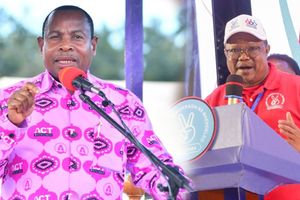Controversy as UK firm seeks to revive exploration work in Tanzania

Illustrative photograph of drilling oil on land. (bashta, iStock at Getty Images).
What you need to know:
- Privately-owned Petrodel Resources said it would invest $100 million in Tanzania exploration activities, a move underpinned by the country’s more business-friendly environment under President Samia Suluhu Hassan and the booming demand for gas.
- However, Tanzania petroleum regulators insist that there is no operational contract signed between the government and Petrodel which claims to own the three blocks.
Dar es Salaam. A controversy is building up over some three natural gas exploration blocks after a UK firm announced plans to revive its dormant operations in Tanzania.
Privately-owned Petrodel Resources said it would invest $100 million in Tanzania exploration activities, a move underpinned by the country’s more business-friendly environment under President Samia Suluhu Hassan and the booming demand for gas.
The UK-based oil and energy company first became involved in Tanzania in 2006, building up an exploration portfolio covering the onshore and offshore Tanga, Kimbiji and Latham blocks.
Since that time, seismic has been shot, partners have come and gone and Petrodel now claims it has retained control of these blocks.
However, Tanzania petroleum regulators insist that there is no operational contract signed between the government and Petrodel which claims to own the three blocks.
The government signs contracts known as Production Sharing Agreements (PSAs) with the respective oil and gas prospecting companies for exploration, development and production of the energy. Both the Tanzania Petroleum Development Corporation (TPDC) and Petroleum Upstream Regulatory Authority (PURA) - which regulates upstream activities – confirm that the government had no agreement with Petrodel for any block in Tanzania.
PURA director general Charles Sangweni said there were currently 11 blocks licensed under eight contracts (companies) for exploration and development activities in the country, and Petrodel was not one of the firms operating the blocks.
TPDC managing director James Mataragio said he had no information of the planned return of Petrodel and that the government did not have any PSA licence with the firm. “In short, we do not have any PSA licence with Petrodel,” he briefly said.
Petrodel’s former partners Afren and Heritage Oil were no longer involved, with Petrodel now claiming the 100 percent ownership over all the three blocks.
Tanzania is home to one of sub-Saharan Africa’s largest gas resources estimated at 57.5 trillion cubic feet.
The resource is waiting for negotiations between the government and international oil and gas companies to build the planned Liquefied Natural Gas (LNG) plant which is expected to cost over $30 billion.
Commenting on Petrodel’s decision, company founder Michael J Prest said the current global demand and supply balance mark that the time is right to accelerate Petrodel’s operations in Tanzania.
“The combination of that and the positive sentiments coming from the new Tanzanian government make further development of these prospects very real. I believe the stable investment platform being created by President Samia Hassan is a good omen for both Tanzania and Petrodel,” he said.
“We look forward to engaging with the government to realize these opportunities.”
Petrodel said will invest approximately $80 million to meet first well commitments in Tanga and a combined total of $20 million to complete final and additional seismic work in both Kimbiji and Latham to bring the fields into production. It is estimated that for the required infrastructure to be in place will take two years. Production and shipments of gas is expected to commence in 2025.





